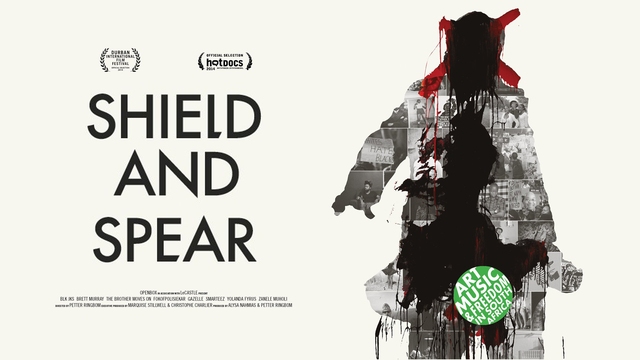Shield and Spear
When 'Big Man of Africa' politics go head to head with contemporary artistic freedom in South Africa
 An artist paints a caricature of South African president Jacob Zuma that provokes a lawsuit, death threats, and a massive street protest. Around this incident, a kaleidoscope of stories about art, race, and freedom of expression bear witness to the challenge of working in a country that, 20 years into democracy, has so far spectacularly failed to uphold its idealistic bill of rights. An exuberant account of the contradictions native to this troubled land.
An artist paints a caricature of South African president Jacob Zuma that provokes a lawsuit, death threats, and a massive street protest. Around this incident, a kaleidoscope of stories about art, race, and freedom of expression bear witness to the challenge of working in a country that, 20 years into democracy, has so far spectacularly failed to uphold its idealistic bill of rights. An exuberant account of the contradictions native to this troubled land.
"It just reminds you of Nazi Germany", says Pop artist Brett Murray, recalling angry demonstrations organised by senior ANC officials in response to his famous satirical painting. "It reminds you of Pol Pot, Russia, China, you know. Any kind of fascist country calls for the burning of art." Forced to seek refuge amid widespread racial anger and calls for his public stoning, Murray found himself at the centre of a storm - his work, a barometer of political pressure in a country ill at ease with its two-tier history. "I'd be lying to you if I said I'm just taking photographs for fun", admits Zanele Muholi, a photographer and LGBT activist who exposes hate crimes ignored by the government and mainstream media. "Photography is not a hobby to me; photography is about politics." She has attracted her own attacks from the culture minister, who has called her work 'immoral, offensive, and going against nation-building'. But as Floyd Avenue, of design collective The Smarteez, suggests, cultural oppression can come from within as well as between perceived groups of people: "You need to understand that black culture is very conservative. I'm not even gay and I'm wearing skirts - trying to free myself from the expectations of the community." One thing common to all three, as well as to the array of musicians and journalists whose stories colour this vibrant portrait of South Africa's art scene, is a determination to find a way through their difficult realities using creativity and self-expression. "It hurts my work; it helps my work", Floyd adds. "You're in a country where everything needs to be fought for before you can get it. You kind of become an innate fighter." Horrifying, funny, and always political, this spirited doc meets the people looking forward in post-Mandela South Africa.
 Official Selection, Durban International Film Festival 2014
Official Selection, Durban International Film Festival 2014
 Official Selection, Sheffield Doc/Fest 2014
Official Selection, Sheffield Doc/Fest 2014
 Official Selection, Sound + Vision, Film Society of Lincoln Centre 2014
Official Selection, Sound + Vision, Film Society of Lincoln Centre 2014
 Official Selection, Hot Docs 2014
Official Selection, Hot Docs 2014
 Official Selection, Antenna Documentary Film Festival 2014
Official Selection, Antenna Documentary Film Festival 2014




